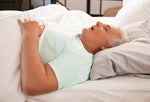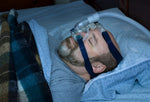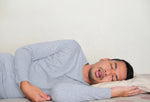On This Page
Zepbound for Sleep Apnea
Our editorial process includes extensive measures to verify accuracy, provide clarity on complex topics, and present factual information. Read more
Key Takeaways
- Zepbound is FDA-approved to treat both obesity and moderate to severe obstructive sleep apnea.
- The drug works by activating GLP-1 and GIP receptors, helping regulate appetite, blood sugar, and metabolism to promote weight loss and reduce OSA symptoms.
- Common side effects include nausea, vomiting, and constipation, while rare but serious risks include pancreatitis, gallbladder issues, and thyroid tumors.
What Is Zepbound?
Zepbound (generic name tirzepatide) an injectable prescription drug manufactured by Eli Lilly. It’s a dual GIP and GLP-1 receptor agonist, meaning it helps regulate blood sugar and support weight loss by targeting hormones involved in appetite and metabolism.
In December 2024, the U.S. Food and Drug Administration (FDA) approved Zepbound to treat moderate to severe obstructive sleep apnea and obesity. People with both OSA and obesity may qualify to receive a prescription for the medication.
How Does Zepbound Help With Sleep Apnea?
Obesity increases a person's risk of OSA, because having more fat in the tongue or around the upper airway can narrow the airway, making it more difficult to breathe during sleep.
Zepbound helps reduce sleep apnea symptoms by promoting weight loss by acting on hormones related to digestion. These hormonal changes reduce a person's appetite, then, by eating less, they lose weight.
The specific receptors targeted by Zepbound sit in the intestines and receive the hormones glucagon-like peptide-1 (GLP-1) and glucose-dependent insulinotropic polypeptide (GIP). As a result, Zepbound is called a GLP-1/GIP receptor agonist, meaning it activates those receptors.
What Are the Side Effects of Zepbound?
Some of the most common Zepbound side effects are related to the GI tract and include nausea, vomiting, acid reflux, and constipation. Some people experience allergic reactions to Zepbound or have a skin reaction, such as a rash or redness, near where the injection was given.
More serious potential side effects of Zepbound include pancreatitis, kidney failure, gallbladder problems, thyroid tumors, and depression. For these reasons, doctors generally need to know if a person has an issue with diabetes or their kidneys, gallbladder, pancreas, or thyroid before prescribing them Zepbound.
Zepbound may also pose a problem when a person goes under anesthesia for surgery or another procedure, as it increases the risk of aspiration (breathing in something other than air). Zepbound can also potentially interfere with hormonal birth control effectiveness. Finally, Zepbound could potentially harm a fetus or infant when taken by someone who is pregnant or breastfeeding.
How Do You Use Zepbound for Sleep Apnea?
People use Zepbound for obstructive sleep apnea by injecting the liquid medication subcutaneously (beneath the skin) once a week, at any time of day. Zepbound can be injected into the abdomen, thigh, or upper arm, and cycling of injection spots is recommended. These injections are generally done at home, either by the person receiving the injection or a family member or caregiver.
Experts suggest also making lifestyle changes while on Zepbound. Specifically, Eli Lilly, Zepbound's manufacturer, recommends also reducing caloric intake and increasing physical activity while on Zepbound to further support weight loss.
Is Zepbound Right for You?
Zepbound is FDA-approved for adults who have both moderate to severe sleep apnea and obesity. If you fit this description, consider talking with your doctor to find out if Zepbound is a good choice for you. Zepbound may be a good choice if your weight plays a role in your sleep apnea symptoms and you've struggled to lose weight on your own.
Talking with a medical professional before beginning Zepbound is important, because it's not the best option for everyone. People with a family history of certain types of thyroid cancer shouldn't use the medication. Your doctor may also recommend not using Zepbound if you're pregnant or have certain health problems involving your stomach, pancreas, or kidneys.
Frequently Asked Questions
Will insurance cover Zepbound for sleep apnea?
Many health insurance companies cover Zepbound for sleep apnea but may require the doctor to give prior authorization before providing coverage. Prior authorization is a request for coverage a doctor can make on behalf of a patient.
In cases where a person's health insurance doesn't cover Zepbound, Eli Lilly offers an option to self-pay for the medication online at a discounted price. This option could save a person between $200 and $550 per month, compared to regular prices.
Does Medicare cover Zepbound for sleep apnea?
Most Medicare plans do not cover Zepbound for sleep apnea, because they don’t cover obesity management medications. That said, you should contact Medicare customer assistance to find out what your plan covers.
Is Zepbound a replacement for CPAP?
Some people may be able to use Zepbound alone to manage obstructive sleep apnea, while others may need to continue to use other sleep apnea treatments alongside Zepbound. In a clinical trial of Zepbound, 42% of people who had moderate-to-severe OSA and didn’t use CPAP therapy were able to either achieve remission or have their OSA severity go down to mild.
Do not discontinue CPAP therapy after beginning Zepbound, unless your doctor recommends it. If you’re hoping to use Zepbound as a sleep apnea treatment without CPAP, discuss the topic with your doctor. Ask them what testing would need to be done and when they would recommend testing to determine if you could discontinue CPAP therapy.
How soon can I expect sleep apnea improvement?
Clinical trials of Zepbound for sleep apnea measured symptom improvement after one year of treatment. However, people report beginning to lose weight a few weeks into using the medication.
How quickly Zepbound improves a particular person's sleep apnea symptoms depends on how quickly that person begins losing weight and how much of a role body weight plays in their sleep apnea.










